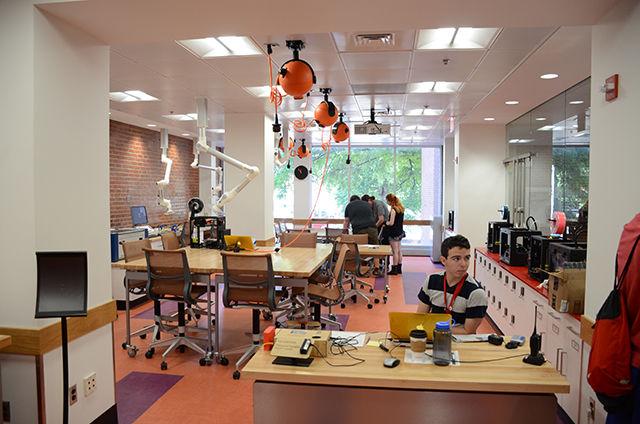Since the D.H. Hill Makerspace was completed just over three years ago, a number of workshops have been offered both during the school year and over the summer, allowing students to use and learn about the variety of technology available in the space. The summer of 2018 is no exception, with workshops ranging from 3D printing to photogrammetry.
Technician spoke with Adam Rogers, the head of Making & Innovation Studio, to learn more about the workshops that are being offered in the upcoming weeks.
Technician: Give me a general overview of the Makerspace. How long has it been open, and what sort of tools are available in it?
Rogers: The D.H. Hill Library Makerspace has been open since June of 2015, and it’s available to all of the students and faculty at NC State. We have lots of tools and technologies available to support students in their course work as well as in their self-directed learning, hobbies and personal projects. We also have 3D printers, we have lots of equipment for electronics, we have a lot of sewing and textiles tools, as well as other types of digital manufacturing tools.
T: For how long has the Makerspace been offering workshops such as the ones taking place this summer?
R: From the start. I think we had some of the initial summer that we opened, and definitely every semester since then we’ve had a pretty strong program of workshops. The workshops are intended to give students a lot of hands-on learning opportunities that can complement what they’re learning in the classroom and allow them to take on new skills and learn how to use new tools that might apply to their academic work or in going into the job market and pursuing their personal interests.
T: Tell me about some of the workshops that are taking place in the next few weeks.
R: We’ve got workshops on 3D printing, 3D design and photogrammetry, which is an approach to 3D scanning an object, or turning an actual object or landscape into a digital 3D model that you can either 3D print or put into a virtual reality environment to do a number of other things with. We have a couple of different electronics workshops covering the two main platforms that we support for electronics prototyping, which are Raspberry Pi and Arduino. Both of those are really easy ways for anyone to get started with interactive electronics, whether or not they have any career electronics background. We also have a couple of 3D scanning workshops as well, which are similar to photogrammetry workshops, just using a different method.
T: Are there any particular differences between workshops held over the summer versus those held over the school year?
A: Not really. We teach the same content, though there’s less people on campus, so there’s more of a chance of a smaller group where you can get more direct project support, though we do try to offer that as best as we can throughout the year as well. It’s a good way for students to learn these tools, especially during a time where you might have extra free time to explore them on their own after the workshop.
T: What do you hope that students attending one of these workshops will get out of their experience?
R: One thing is that it’s a very good conceptual introduction to the technology that the workshop is on, knowing what its potential is and what tools you can get started with. For instance, in the 3D printing workshop, you learn kind of what 3D printing is and what its good for in applications across a lot of industries. You’d then learn the first steps to take to start to actually make something for the 3D printer and get to use it. We try to give hands on experience in all of our workshops, so that it’s not just a lecture format and students get to operate the 3D printer and see the process of going from a design file to a printed object. Another thing they’ll get is just an understanding of how the library is here to support students and their projects, so they can come right back to that same space where we’re teaching them or to get support with their own work.
A list of the available workshops, as well as the links to register for them, can be found at go.ncsu.edu/make in the Upcoming Workshops section.













